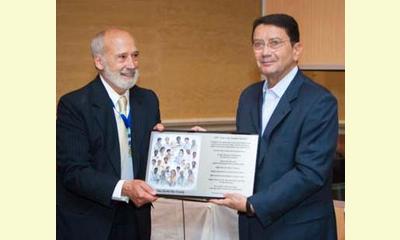|
|
Peace Tourism CEO Urges Collective Industry Voice to Avert Wider Syrian Conflict
an article by Imtiaz Muqbil, Travel Impact Newswire
The Founder and President of the International
Institute for Peace Through Tourism (IIPT) has
called on the travel & tourism industry to raise
its collective voice in averting yet another
conflict, this time in Syria. In a special message
to the industry at the request of Travel Impact
Newswire, Mr Louis d’Amore said it is time to
learn the lessons of past world wars and heed
Mahatma Gandhi’s words that an eye for an eye will
leave the whole world blind.

Louis D'Amore (left) with Dr. Taleb Rifai, Secretary-General of the United Nations World Tourism Organisation. Foto from IIPT Newsletter
click on photo to enlarge
Mr d’Amore’s message, reproduced in full below, is
designed to motivate other travel industry
groupings, organisations and associations
worldwide to pluck up the courage to follow suit.
It comes in the midst of growing concerns within
the so-called industry of peace over gathering
storm-clouds in the Middle East. Arguably the
first travel & tourism industry executive to rise
to the occasion and make such a call, Mr d’Amore’s
comments carry more weight because he is a 77-
year-old former U.S. war veteran. This year, he is
marking the 25th anniversary of the founding of
the IIPT, which is solely devoted to the cause of
promoting peace through tourism.
The war-drums were thundering last week just as
the UN World Tourism Organisation’s 20th General
Assembly was in session in Zambia/Zimbawe.
However, the apex gathering of the world’s
seniormost tourism leaders opted for politics over
principle. Not a single resolution was passed to
even obliquely refer to the looming war. Tourism
leaders pay much lip service to tourism as a force
for peace and job-creation, but when a man-made
crisis looms that can be disastrous for both peace
and jobs, they’ve got no shortage of excuses for
not stepping up to the plate.
The twin themes of the General Assembly session were
visa facilitation and aviation linkages, with much
talk about the need to improve infrastructure,
dismantle regulatory restrictions, raise financing,
create easier visa regimes, etc.
During the formal plenary speeches, however, only
two tourism leaders, from Kenya and Turkey, made
deeper references to the clear inter-connectivity
between peace, visas, aviation and tourism. Their
specific comments are also reproduced below.
(This article is continued in the discussionboard)
|








|
DISCUSSION
There is no question yet associated with this article.
* * * * *
LATEST READER COMMENT:
(The following is continued from the main article listed above)
This editor asked both if they planned to give their message more traction by drafting an anti-war resolution for potential passage by the General Assembly. Both said they were keen but felt that the Europeans and other U.S. allies would jam it; asked if it would be worth a try anyway, both said they would think about it Eventually, however, nothing happened.
At the General Assembly, Mr d’Amore’s IIPT hosted a breakfast session to mark its Silver Jubilee. One of the speakers was UNWTO Secretary-General Dr Taleb Rifai who lauded the links between tourism and the promotion of cultural understanding, what he referred to as a “higher purpose” that is served beyond jobs and economic gains. “Travel has become an essential aspect of life,” he said. “There can be no real peace without us respecting, understanding and appreciating each other and celebrating our diversity. You can never hold any resentment against the people of any country you have visited.” Unlike any industry, Dr Rifai said, “travel touches us as human beings and changes us in a way that is definitely good.”
Neither Dr Rifai nor any of the other speakers made any reference to the brewing conflict which had just been averted that same day by a hair-breadth, thanks to the anti-war vote in the UK Parliament!
When President Obama then opted to take his case to the U.S. Congress, another window of opportunity opened for travel & tourism to initiate a protest. . ...more.

|
|








